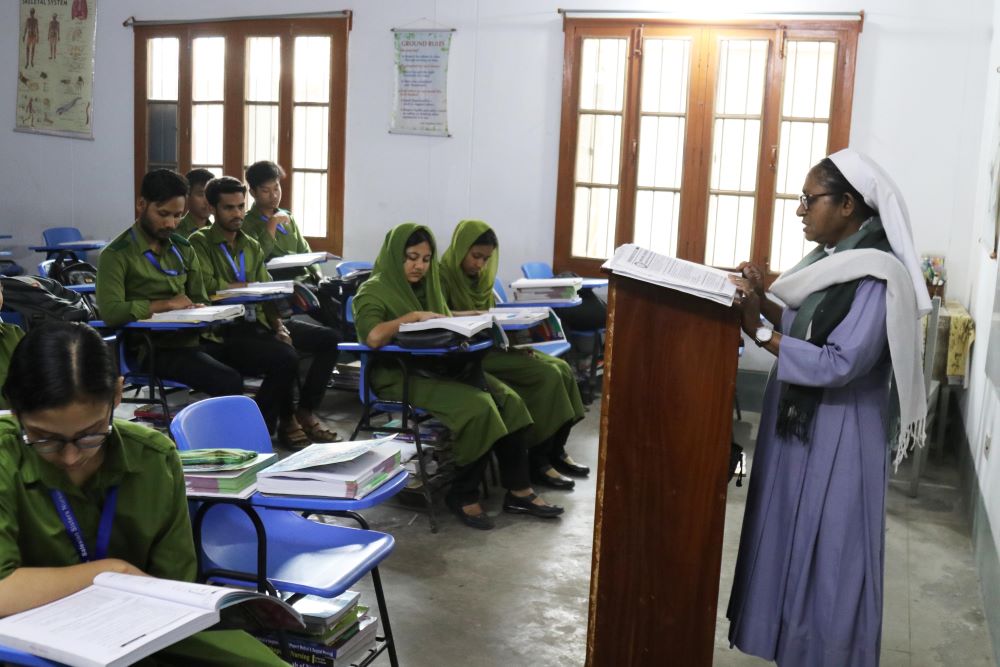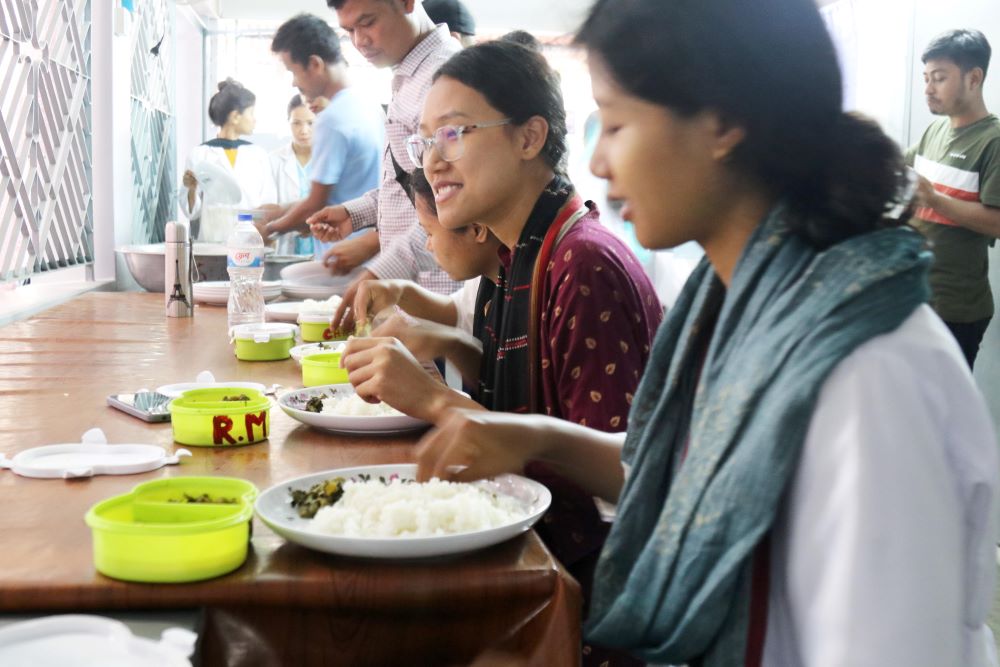Sr. Leah Drong, 60, a sister of the Salesian Missionaries of Mary Immaculate, teaches at the Salesian Sisters' Nursing College in Mymensingh, Bangladesh. In 2022, the Salesian Sisters received government approval to teach a bachelor's program in nursing. (GSR photo/Stephan Uttom Rozario)
Sr. Leah Drong, a member of the Salesian Missionaries of Mary Immaculate, wanted to become a nun since childhood, but she was not interested in nursing. In the end, she studied nursing and built Salesian Sisters' Nursing College in Mymensingh, where poor students are studying.
Drong, the youngest of 10 siblings, was born in 1964 to a Garo tribal family in a remote area of the Mymensingh Diocese in Bangladesh. She entered the missionary community, locally known as the Salesian Sisters of Bangladesh, in 1987, took her first vows in 1989 and her final vows in 1997. She learned French and went to Benin for missionary work in 2000 and worked there until 2007.
She studied up to secondary school at Biroidakuni High School in the Mymensingh Diocese, dominated by Garo and other tribal people. Later, she obtained a bachelor's in nursing from Kumudini Nursing College. She also studied Philippine communication and pastoral management for one year. Most recently, she completed a master's in public health from American International University-Bangladesh.
Drong recently spoke to Global Sisters Report about how she became a missionary and later a nurse, built a nursing college, and the challenges she faced and the challenges she faces now.
GSR: How did you become a missionary?
Drong: I loved to read the books of saints. The biography of St. Thérèse of Lisieux inspired me to become a missionary. She became a nun when she was 15 years old. Due to her young age, she could not go to the community to become a sister. I also wanted to be a sister at a young age, but they didn't want to take me, either.
My father died when I was only 4 years old, and my mother did not want to leave me. We were very rich, and mother used to say: Who will see so much wealth? However, my brothers and sisters saw my desire and helped me become a sister. With everyone's help and God's will, I became a sister. Growing up in a village, I didn't even know how many sisters there were, I just knew sisters meant sisters.
Did you want to become a nurse after professing your vows as a nun?
At first, I had no interest in nursing, but when I went to the village after becoming a sister, I saw that the placenta was not falling after the delivery of a woman. Since I am a sister, the people thought I was competent in this work. They called me, but I couldn't do anything. From then on, I felt that if I were a nurse, this woman would have benefited, and from there, my interest in nursing grew, and I went on to study nursing.

Sr. Mery Rani Rozario, teaches at the Salesian Sisters' Nursing College in Mymensingh, Bangladesh. The sisters started the nursing college to provide opportunities for poor Catholics, especially from the Indigenous community. (GSR photo/Stephan Uttom Rozario)
Why did you feel the need to open a nursing college even though there are many nursing colleges in the country?
I first taught at a Protestant nursing college but saw that our poor Catholics from the area, especially from the Indigenous community, do not get opportunities there. After that, I saw there were neglected tribal students. And since nursing is now a very competitive profession, our poor children cannot survive there. Since then, I started thinking about opening a nursing college.
How did you turn your thoughts into reality?
I told my superiors about my desire to establish a nursing college. After expressing my enthusiasm, my superiors said, "If you have the courage and the spirit, you can start." Later, I tried to implement my idea. I did not have the money, so my friends from France gave me some money. With that money, we started the class with 30 seats in a tin shed.
Did you have any problems with the nursing college approval?
Getting approval was easy because one of my professors was associated with approval. So, we didn't have much of a problem. A secretary in the secretariat from our tribal community helped us a lot. So, with the help of our people and the blessings of all, we built this nursing institution. Its name is Salesian Sisters' Nursing College. Initially, only a diploma in nursing and midwifery was offered.
After that, when did you start the bachelor's?
To study nursing, one has to spend a lot of money, which is not possible for our tribal people. I reached out to different places for help, and again, my friends helped me. In 2022, we got government approval to teach a bachelor's in nursing. Now, two batches of B.Sc. nursing are running. Due to lack of money, we are not able to complete the work of our building, so we cannot admit students on a large scale. Our college needs so much. Many students don't even get a chance at admission because we have a small number of seats here.
How many students can you admit in a year?
We can admit 60 students for a diploma, 20 in Post Basic B.Sc. and 30 in Basic B.Sc. At the same time, we have residential hostel facilities for 140 people. The number of seats in our college depends on our building. The faster we build the building, the faster we can admit more students.

Students of the Salesian Sisters' Nursing College eat lunch on the college's premises in Mymensingh, Bangladesh. The sisters do not have the money to complete their building and admit more students. (GSR photo/Stephan Uttom Rozario)
You said the college was built with the tribal groups in mind. Can only Indigenous study here?
As the tribal groups are still financially, educationally and socially struggling, we give them more priority but give others a chance. We give more importance to the poor and struggling groups than merit. My goal is to provide a system for the poor to stand on their feet.
How many students are studying without fees?
Even if there is a fee for everyone, many cannot pay the full amount. We even have to provide necessities for some. Twenty-five percent of students cannot pay anything, and another 25 percent can pay partially. The remaining 50 percent can pay. Those who are not able to pay now will give us service here after their studies.
What challenges do you have to go through when you start a nursing institute?
Our first challenge was the economic challenge, and that still exists. Another challenge is that we didn't have a hospital to do clinical practice. The Mymensingh Medical College is a government institution, and it was very difficult to get permission for clinical practice there. But as we are missionaries, we got the approval for our students for a low cost.
How many teachers are in the institute, and do their salaries come from student fees?
We have 12 permanent teachers, including seven sisters and some guest lecturers. We sisters are not taking a salary. The money we receive from our students as fees is almost entirely for the salaries of our teachers and maintenance.
What challenges do you currently have?
Our main challenge is the crunch of money. Due to lack of money, we are unable to construct new buildings.
Advertisement
We know that the missionary sisters teach religion. Why did you choose nursing?
I can reach people's hearts through this nursing profession, which I can't do through other professions. However, we are not limited to teaching nursing. In the afternoon, we visit families, go to the homes of sick people to serve them and go to families to listen to their thoughts. After that, we also go to different villages to teach religion.
Do you have something to share about your nursing college and your work?
All I can say is pray for us. The problem with the construction of the nursing college building is finance. Will we get friends to solve that problem? It's not only the building because there are more expenses. We will welcome any financial support for us.
What is your last wish or dream?
My dream is to overcome the poverty of these people so they can become self-reliant and meet all their needs. I dream that one day, they can. I hope that my dream will become a reality with everyone's help.







